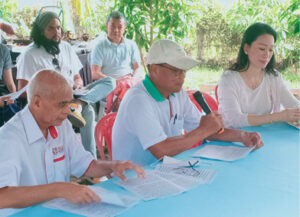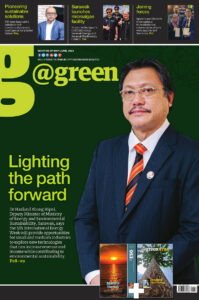Food safety starts with taking care of the soil and going back to nature
Dec 5, 2021, was World Soil Day. A group of committed individuals and professionals gathered at the Back2 Nature Farm in Kampung Acheh, Kuala Pilah, Negeri Sembilan to mark the occasion and to witness for themselves a farm that does not use chemicals in the cultivation of crops.
The farm is the brainchild of Dr Ting Ho, a 74- year-old self-taught agropreneur whose main goal now is to lead the farm community to heal the earth and create a sustainable, regenerative world. He wants to show that sustainable agriculture can thrive without chemicals if the soil is healthy.

Dr Ting Ho is a Wharton trained economist with no formal training in agriculture. His keen interest and vision to produce safe crops and food has led him to start this Back2 Nature farm.
Tan Sri Prof Emeritus Syed Jalaluddin officiated at the event. He commended Dr Ho and Thought For Food (TFF) Southeast Asia region, represented by its CEO Melissa Ong, for organising the event and creating awareness of the importance of maintaining our soils in a healthy state.
Soil quality is deteriorating due to pesticides and even fertilisers’ rampant use. The soil structure consists of physical, chemical and biological properties. The natural aspect is often least understood, but it has a significant role in supporting healthy plant growth, and the Back2Nature farm demonstrates this.
Dr Ho’s farm merely uses natural fertilisers such as cow dung and other techniques in soil enhancement suitable for all crops and plants.
Prof Syed Jalaluddin, who recently launched the newly established Academy of Tropical Agricultural Sciences (ATAS), discovered that agropreneurs were not necessarily people with an agricultural background and came from diverse professions and educational backgrounds.
He feels that ATAS can also be the right body to consider awarding Dr Ho as a Master Farmer who can undertake training to create farms that grow crops in a safe and sustainable environment.
Food with antioxidant properties
In many urban communities in Malaysia, the local councils also encourage urban farming initiatives. It is an opportunity for these groups to avoid using chemicals but resort to natural farming techniques.
I was privileged to experience the event and understand Dr Ho’s vision. Though 74, he looked younger. It is due to his relationship with nature, the fresh air and physical activities. They sustain his physical energy and health.
Looking at the plants, herbs and spices that he has planted, it is proof that the age old fashioned technique of using cow dung and compost for manure can produce great results. The papayas were huge.
Markisa or passion fruit, a species of vine, grows well here. We quickly plucked it to taste its sweetness. I enjoyed the juice imported from Medan, Indonesia, when I was a kid, but this was the first time I saw the vines and fruits up close.
Other herbs and spices grown included Mahkota Dewa or God’s Crown (Phaleria macrocarpa), indigenous to Indonesia and Papua New Guinea. Its red coloured fruit is sliced and dried before being used as a tea-like drink.
It has high antioxidant properties and lowers cholesterol, gout, high blood pressure, and diabetes. I can attest to its efficacy as I have been drinking it since 2004 after visiting Kraton in Solo and buying a packet there. At that time, I had just experienced an attack of gout. It was just the solution for my condition then.
Another exciting herb planted was the Misai Kucing (Orthosiphon Aristatus), a medicinal herb native to Southeast Asia, India and China. The plant grows up to three feet and has green leaves and beautiful white and pink flowers.
It is used as a herbal drink high in antioxidants to treat diabetes, gallstones, bladder issues and related conditions. There are also other plants such as buah kedondong, bidara, brinjals and ulam raja.
Preserving our native flora and fauna
World Soil Day is celebrated worldwide to give thanks to the soil that sustains all life on earth. The ecosystem needs love and care.
If you see a cabbage or a leaf that is so smooth and clean without any holes eaten by insects, you can be sure it has been treated with pesticides which is a danger to our health if it is not appropriately cleaned before consumption. Yet most of us do not seem to care and take it for granted that it is ok.
The fact also remains that chemically treated soil and pesticides do more harm than good to the earth and the ecosystem. When worms and natural insects that provide nutrients are eliminated, the ground will die, and plants cannot grow.
The current health issues such as cancer, allergies, infertility etc., faced by the world are all related to the food we consume. Commercialisation and fast foods in the name of modern lifestyle and laced with preservatives and even so-called fresh vegetables, fruits and herbs using chemical fertilisers and pesticides are the real culprits.
Dr Ho feels it is time to turn back to nature and promote biodiversity. There is an urgent need to have a robust and regenerative nature.
To do this, we have to start from ground level literally and assume nothing. To unlearn what we have learnt and to relearn. Over the past few months, Back2Nature has learned the meaning of regenerative soil, power of regeneration in plant cuttings, interactions between microbes and plant health and co-existence with other creatures on the farm.
The need to preserve our native flora and fauna in the villages and forests and what is left of the green lungs in the urban areas are critical in sustaining life. One of Back2nature’s missions is to educate the generation of students, teachers and leaders about agroforestry and food cultivation in a jungle setting.
By working with the Academy of Tropical Agricultural Sciences (ATAS), UTM, UM and UPM, he hopes that the many lab tests conducted will be tested on the farm to benefit the farmers. Key among the various collaborative projects include micronutrients, soil bio-remediation, wild forest honey and beneficial teas.
As change is the only constant in life, we hope that this effort will lead to better things in food safety and start with taking care of the soil. No matter how humble and small Back2Nature is, but poor, desperate and helpless it is not.
— @Forest
The Green Dude feels enlightened by Back2Nature as he too is making a small effort on his neighbour Cikgu Nik Anwar’s two-acre farm in Hulu Yam by planting herbs and spices sans chemicals and pesticides. Sadly, the farm and its banana plantation neighbour were hit by the floods on New Year’s Day. We wish Dr Ho well as he strives to rehabilitate the farm.








